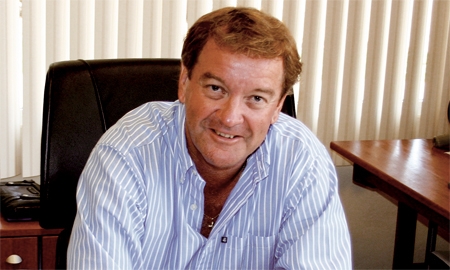Densely forested and characterized by large areas of biological diversity, Suriname has been the target of increased interest in large-scale commercial logging – particularly in the forest belt - which has raised environmental concerns. To offset these actions, the government is applying new management plans of land use.
“I have to say that, in the past, the forestry sector has had kind of a black eye or a bad name,” admits Ty Wilkinson, Chief Executive Officer and Regional Director of
Greenheart Forest Technologies N.V. (
Greenheart).
This point of view appears to be the general consensus within Suriname and the strategy now applied by the government has clear and more transparent objectives. Ginmardo B. Kromosoeto, Suriname’s Minister of Labor, Technological Development and Environment, has expressed his intentions to work hand in hand with foreign investors towards a common and greener goal, in the joint development of Suriname’s industries.
Mr. Wilkinson coincides with Mr. Kromosoeto’s intentions: “We want to promote how to work with clean energy and safe materials. We want to work in the forests where you only harvest the biggest trees.”
The Greenheart Group, a Hong Kong-based company, entered Suriname through the acquisition of several forestry companies and today has more than 300,000 ha of land in concessions from east to west. Mr. Wilkinson details current company actions: “We are building a state-of-the-art sawmill facility in our western concession and we are duplicating the sawmill facility in our eastern concession.”
“We are fully committed to being the largest natural forestry company, possibly in the world. That’s our goal... But we will do it only in one way: in a sustainable way.”
Ty Wilkinson, CEO Greenheart Forest Technologies N.V. and Regional Director, Suriname |
With capitalization being pumped into the business, Greenheart aims to maximize production. “When both of these operations are up to speed, we will be harvesting approximately 200,000 cubic meters per year in the west, and 120,000 cubic meters in the east. So, if you add those up, you come to a total that exceeds the whole sector of this production,” explains Mr. Wilkinson.
In its commitment to harvest while ensuring sustainability, Greenheart conducts its work using cutting-edge GIS technology systems for spotting trees. “We have a full team that does this which enables us to selectively harvest. We are allowed to cut a maximum of 25 cubic meters per hectare. So if you look at that, in reality, a hectare which is 2.5 acres for us Americans, that’s maybe five or six trees in those 2.5 acres. So it’s very sustainable,” ensures Mr. Wilkinson.
The company’s activities include sawing lumber, collaborating with giants like
Surmac, and working towards value-added products such as recovering the 65%waste material that results from round logging. “Those recovery products will include something that everybody knows that we’ve been working on which are pallets for banana companies,” says Mr. Wilkinson.
Suriname’s population is concentrated in the capital and along the coast. It is therefore not surprising that “when we talk about development and job creation, we talk about Paramaribo and the coast because half of the population lives in the coastal area,” recognizes Mr. Kromosoeto.
One of his objectives is that the local people, in the interior, benefit from the development.
The “Made in Suriname” quality signature mark was created to achieve local, regional and international recognition of Surinamese products. By carrying it in its export products, Greenheart is further contributing to the country’s economy while demonstrating its proficiency, as this imprint is only issued to responsible producers.
With the number of export containers leaving from the country’s ports expected to increase in the near future, the required manpower to handle this cargo will also rise as the name of Suriname reaches different corners of the world. Tourism will be created and the trickle effect will reach local communities and boost the local economy.
“We are fully committed to being the largest natural forestry company, possibly in the world. That’s our goal,” explains Mr. Wilkinson. “But we will do it only in one way: in a sustainable way. In a manner that gives back to the communities around us, that respects the forest and provides opportunities of growth for the Surinamese folks.”
As Greenheart continues to expand, it is committed to creating as many jobs as possible. “Right now, between the two divisions we have about 170 employees. This will ramp up to somewhere around 700 when we’re in full production,” says Mr. Wilkinson. The workforce will be receiving solid training from foreign experts who will be brought in to occupy the higher technical positions.
“We have a huge respect for the forest and not only the forest, but also the people who live in the forest, and the cultural aspects of the communities that are affected by us,” adds Mr. Wilkinson.
Daily involvement with the local community includes transporting the children to and from school and instilling environmental awareness with activities of waste removal. “We want them to grow vegetables, we will purchase that produce from them to feed our employees so we’re creating sustainable employment for these folks, and then we will also employ people in the region to the extent that is possible,” explains Mr. Wilkinson.
Greenheart’s principles and criteria for sustainable management and utilisation of the rainforests in Suriname have awarded it the CELOS certification, and the company is now working for the FSC qualification in an effort to further demonstrate its commitment to social and environmental responsibilities.

1 COMMENT
is the demand for your lumber on the rise or is it stagnant? how long will it take to get up to full production and employ 700 workers?